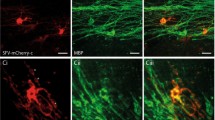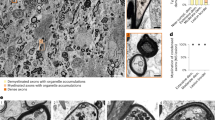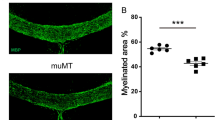Abstract
OLIGODENDROCYTES synthesize myelin in the central nervous system and maintain it in lamellar sheaths around axons. Techniques for studying oligodendrocyte development in vitro1 can be used, indirectly, to investigate the myelin injury that occurs in human and experimental demyelinating disease2. Cell-mediated immune mechanisms are necessary but not sufficient to induce myelin damage in vivo; more recently complement has also been implicated in the pathogenesis both of multiple sclerosis3–5and experimental allergic encephalomyelitis6. Previously we have demonstrated that antibody-independent complement activation occurs in vitro at the oligodendrocyte surface7. Here we show that the ensuing oligodendrocyte injury is reversible, and that recovery involves the release of membrane-attack complex-enriched vesicles from the surface of viable cells. The demonstration of morphologically and immunochemically identical vesicles in the cerebrospinal fluid of patients with multiple sclerosis suggests that reversible complement-mediated injury contributes to myelin damage in vivo.
This is a preview of subscription content, access via your institution
Access options
Subscribe to this journal
Receive 51 print issues and online access
$199.00 per year
only $3.90 per issue
Buy this article
- Purchase on Springer Link
- Instant access to full article PDF
Prices may be subject to local taxes which are calculated during checkout
Similar content being viewed by others
References
Raff, M. C., Miller, R. H. & Noble, M. Nature 303, 390–396 (1983).
Waksman, B. H. & Reynolds, W. E. Proc. Soc. exp. Biol. Med. 175, 282–294 (1984).
Compston, D. A. S., Morgan, B. P., Oleesky, D., Fifield, R. & Campbell, A. K. Neurology 36, 1503–1506 (1986).
Sanders, M. E. et al. J. Immun. 136, 4456–59 (1986).
Compston, D. A. S. et al. Neuropath. & appl. Neurobiol. (in the press).
Linington, C. P. et al. Brain (in the press).
Scolding, N. J. et al. J. Neurol. Sci. 89, 289–300 (1989).
Cyong, J-C. et al. J. exp. Med. 155, 587–597 (1982).
Vanguri, P., Koski, C. L., Silverman, B. & Shin, M. L. Proc. natn. Acad. Sci. U.S.A. 79, 3290–3294 (1982).
Morgan, B. P. Complement Inflamm. (in the press).
Campbell, A. K. Biochem. J. 143, 411–418 (1974).
Houston W. A. J. et al. J. Biolum. Chemilum. 2, 212 (1988).
Bourguignon, L. Y. W. & Bourguignon, G. J. Int. Rev. Cytol. 87, 195–224 (1984).
Poser, C. M. et al. Ann. Neurol. 13, 227–231 (1983).
Herndon, R. M. & Johnson, M. J. Neuropath. exp. Neurol. 29, 320–330 (1970).
Linington, C., Webb, M. & Woodhams, P. L. J. Neuroimmun. 6, 387–394 (1984).
Campbell, A. K., Hallett, M. B. & Weeks, I. Meth. biochem. Analysis 31, 317–416 (1985).
Author information
Authors and Affiliations
Rights and permissions
About this article
Cite this article
Scolding, N., Morgan, B., Houston, W. et al. Vesicular removal by oligodendrocytes of membrane attack complexes formed by activated complement. Nature 339, 620–622 (1989). https://doi.org/10.1038/339620a0
Received:
Accepted:
Issue Date:
DOI: https://doi.org/10.1038/339620a0
This article is cited by
-
Interactions Between Extracellular Vesicles and Autophagy in Neuroimmune Disorders
Neuroscience Bulletin (2024)
-
Innate Immunity Communicates Using the Language of Extracellular Microvesicles
Stem Cell Reviews and Reports (2021)
-
Anti-CD20 Monoclonal Antibodies for Relapsing and Progressive Multiple Sclerosis
CNS Drugs (2020)
-
Therapy resistance mediated by exosomes
Molecular Cancer (2019)
-
Extracellular vesicles as circulating cancer biomarkers: opportunities and challenges
Clinical and Translational Medicine (2018)
Comments
By submitting a comment you agree to abide by our Terms and Community Guidelines. If you find something abusive or that does not comply with our terms or guidelines please flag it as inappropriate.



